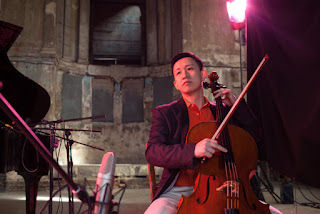 |
| Michael Foyle, Maksim Štšura - photo Alastair Merrill |
Maksim Štšura, Michael Foyle, Joseph Shiner, Yelian He
Omnibus, Clapham
Reviewed by Robert Hugill on Oct 2 2016
Star rating:
Young artists bring Messiaen's intense masterpiece to Clapham arts centre
 |
| Joseph Shiner |
The music room at Omnibus is a upstairs room in this former-library, with a high ceiling and lively, yet intimate acoustic.
 |
| Yelian He |
Dance of fury for the seven trumpets has the four instruments in unison. Though the melody was pure Messiaen, the players brought out the uneven rhythms in a way which was rather catchy and almost jazzy. The playing was full of energy, and with a remarkable intensity in the louder sections. Tangle of rainbows brought a variety of textures as Messiaen refers to music from previous movements, and the young players combined the whole into something passionate, yet vivid and full of vivacity. Finally, Praise to the immortality of Jesus for just violin and piano. Here Foyle gave us another long sung melody, with sweet tone and an impressive control, and in the final section exited the concert hall whilst playing, a nice touch.
Messiaen's quartet is challenge for all four players, with writing which is taxing yet requiring a collective spirit in the performance. The performers have already played the work at the Deal Festival and in Manchester, and the comfortably form a chamber ensemble where the players combine virtuosity with a sense of really listening.
With great works of art, different performers find different things in the work and this is certainly true of Messiaen's quartet. The four young performers gave us an account full of vitality, energy and intensity. They did not bring out the mystical religious side of Messiaen's vision, but instead gave us something which was very present, and rather earthy in its vibrant humanity.
Elsewhere on this blog:
- Nyman revisited: Two Tempest themed scores from the 1990s - CD review
- Dystopic Hollywood noir: Mozart's Don Giovanni at ENO - Opera review
- Vibrant young theatre: Opera for All and Garsington Opera in Grimsby with a project on Eugene Onegin
- Mozartian fragment: Classical Opera in Zaide - CD review
- Luxury voices: Sonoro in Rachmaninov's Vespers - concert review
- Ice and longboats: Ancient music of Scandinavia - CD review
- Visceral Verdi: Noseda conducts LSO in Verdi's Requiem - Concert review
- Wit and wisdom: Steven Isserlis re-visits Schumann's advice for young musicians - book review
- Tour de force: Barry's Beethoven - CD review
- Enjoyable and engaging: Opera Settecento in Hasse's Demetrio - opera review
- Home











No comments:
Post a Comment